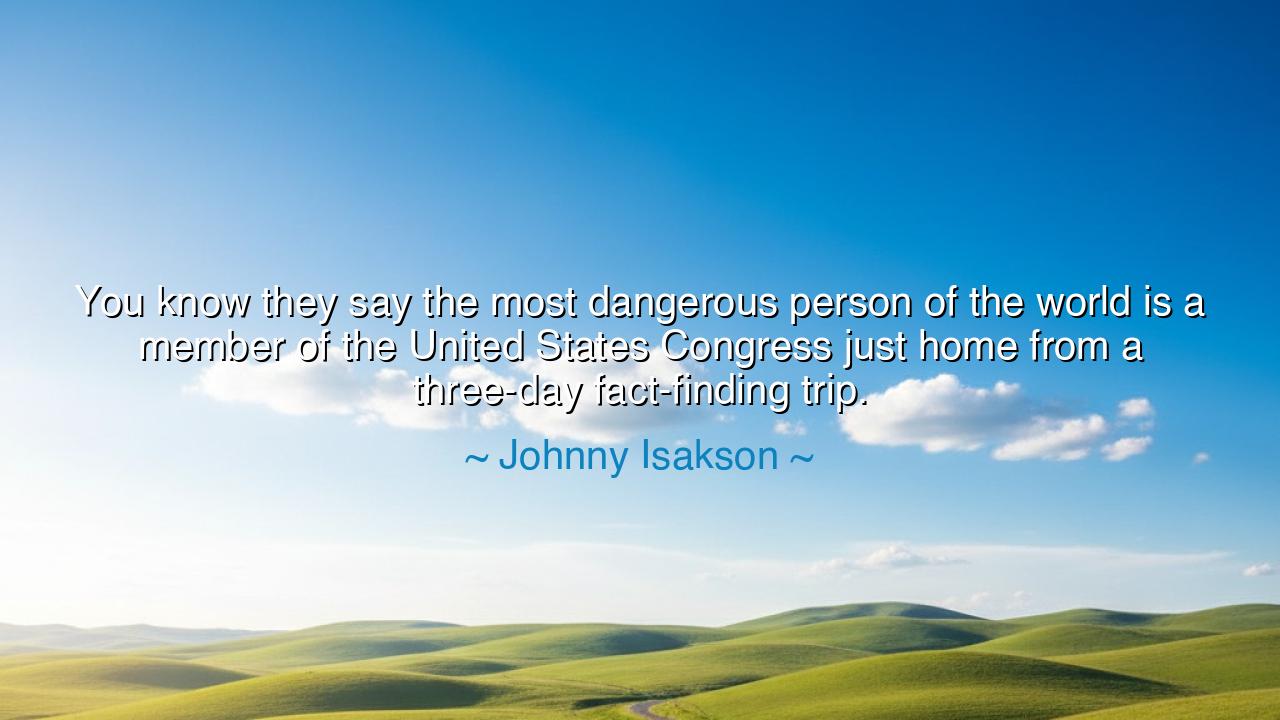
You know they say the most dangerous person of the world is a
You know they say the most dangerous person of the world is a member of the United States Congress just home from a three-day fact-finding trip.






The words of Johnny Isakson, spoken with humor sharpened by wisdom, reveal a paradox of leadership: “You know they say the most dangerous person of the world is a member of the United States Congress just home from a three-day fact-finding trip.” Beneath the jest lies a serious truth about politicians and the temptations of half-knowledge. For when power is joined with incomplete understanding, the results can be reckless, even perilous.
The ancients knew this danger well. In the dialogues of Plato, Socrates warned against those who possess only fragments of wisdom but imagine themselves masters of truth. Such men, he said, are more dangerous than the ignorant, for they cloak folly in the guise of knowledge. Isakson’s words echo this: the congressman who has seen a glimpse of foreign lands or crises may return convinced of expertise, wielding fresh but shallow impressions with the authority of power.
Consider the tale of the Crusades. Many knights and nobles, returning from brief ventures in the East, spread exaggerated tales of wealth, savagery, or holiness. Their words, though born from limited encounters, stirred kings and peoples into wars of vast consequence. The little they had seen was magnified into policy, and generations suffered. So too, Isakson suggests, may modern leaders return from a short journey bearing not true wisdom, but dangerous conviction.
His humor also reflects the rhythms of democracy. A fact-finding trip is meant to enlighten, yet it often becomes theater, with politicians returning eager to broadcast their discoveries. But facts without depth, divorced from context, may mislead more than they inform. The danger is not travel itself, but the arrogance of mistaking three days’ sight for full understanding. Here, Isakson teaches that true leadership requires humility—to admit how little one knows even after seeing much.
Let the generations remember: the most perilous weapon is not ignorance, but half-knowledge wielded with confidence. Isakson’s jest carries this eternal lesson—that wisdom is slow, careful, and humble, while haste and shallow learning can shape decisions that affect nations. To seek truth is noble; to claim mastery after a mere glimpse is folly. The leader must travel, must learn, but above all must remember that the world cannot be known in three days, nor its destiny shaped by snapshots mistaken for vision.






TNNguyen Tuong Nghi
Is there a risk of oversimplification in politics when lawmakers return from fact-finding trips and assume they have all the answers? While exposure to new information is crucial, does it really prepare someone to make informed, long-term decisions? How can we ensure that politicians dig deeper into issues before making impactful decisions, rather than relying on a few days' worth of exposure?
MTtran thi minh tu
What does this quote say about the influence of brief experiences in shaping political opinions? It almost seems to suggest that some politicians come back from short fact-finding missions with a sense of authority that may not be deserved. How does this dynamic affect policy-making? Could it lead to decisions that are not fully grounded in the reality of the issues being addressed?
NPNhung Pham
Could Johnny Isakson be highlighting the potential dangers of politicians who feel empowered with limited knowledge? The notion that a short, fact-finding trip might lead to misguided decisions is concerning. Does this reflect a broader issue with how politicians approach complex problems? How much of our political decision-making is influenced by temporary exposure to issues, and how can we ensure that lawmakers are better informed before they act?
TTQuynh Trang Tran
Is this a criticism of how politicians can sometimes overestimate their knowledge after brief fact-finding trips? The idea that a few days in a location could make someone an expert seems a bit far-fetched. How often do we see lawmakers come back with solutions that oversimplify the complexity of the issues they’ve studied? Shouldn't deeper understanding require more than just a short trip or surface-level engagement?